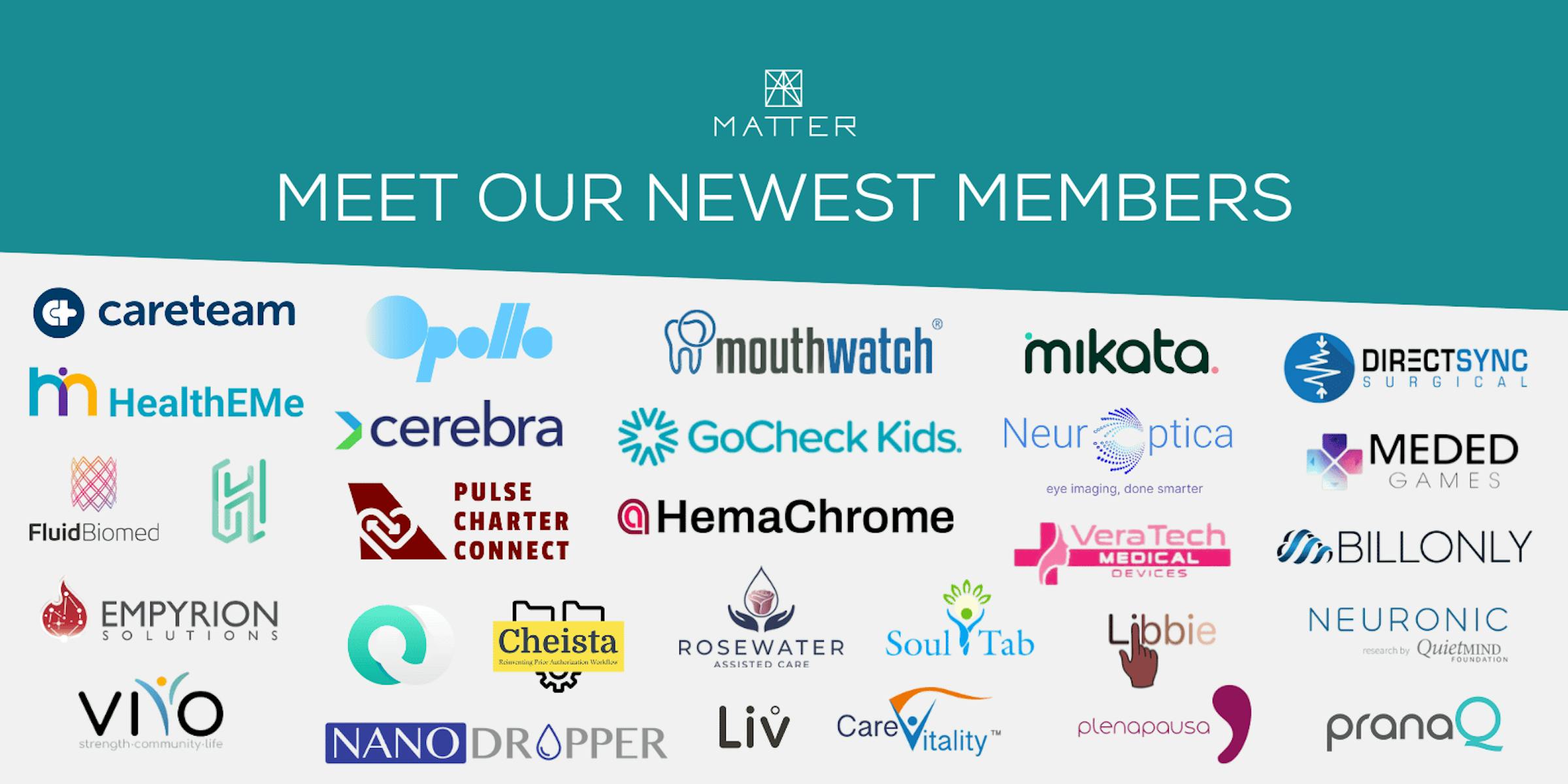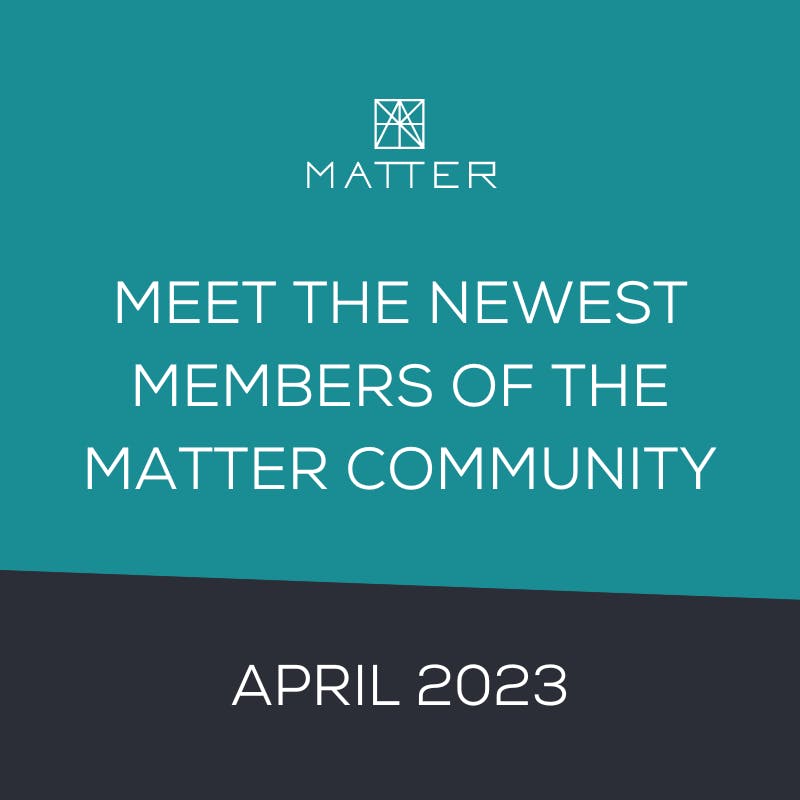April 2023: Meet the newest members of the MATTER startup community
In Q1 2023, 34 startups became members of the MATTER community. They join us from all over the world with innovations in digital health, medical devices, diagnostics and services. Continue reading to learn more about our newest members.
If you’re interested in joining the MATTER community, you can apply today or request more information and a member of our team will be in touch.
Meet the startups
Digital health startups
BillOnly — Phoenix, Arizona
BillOnly is a software as a service solution that will simplify the management of sales reps within healthcare facilities. BillOnly specializes in the communication between hospital staff, healthcare providers and vendors, making the vendor-owned inventory process efficient for all stakeholders. Their solution allows the healthcare network to instantly find the correct vendor, check if items are on contract, track and acknowledge delivery and finally receive a charge sheet from the vendor immediately after the case is completed.
Careteam Technologies — Vancouver, Canada
Careteam is a unified, secure, multilingual and workflow-enabled patient-success platform that sits as a smart overlay to electronic medical records. Unlike other care coordination software that focus on one disease, setting or organization, Careteam is an integrated solution that can cover multiple health conditions at scale and adapt as care settings, providers and support change. They deliver on the Institute for Healthcare Improvement’s quadruple aim benefits: patient and provider satisfaction with better outcomes at lower costs.
CareVitality — Skokie, Illinois
CareVitality helps healthcare providers develop seamless chronic care management and transitional care management programs to improve patient outcomes and drive recurring revenue without the need to increase staff. They assist providers in creating a better work-life balance by utilizing their patient-centered clinical care team. Their healthcare technology and care management services help improve the health of patients and the wealth of healthcare practices.
Cheista — Arlington, Virginia
Cheista improves the efficiency and effectiveness of prior authorization processes through artificial intelligence (AI) and natural language processing for both payers and providers. Their mission is to provide a seamless, user-friendly and reliable automated prior authorization workflow that enables healthcare providers to obtain the necessary approvals for their patients’ treatments in a timely and cost-effective manner. Their medical assisted review product is a cutting-edge software solution that leverages the power of natural language processing to help healthcare professionals quickly and easily interpret coverage policies and guidelines.
Empyrion Solutions — Chicago, Illinois
Empyrion Solutions provide a software platform to medical clinics for remote vital sign monitoring services for Medicare patients with chronic conditions.
HealthEMe — Halifax, Canada
The HealthEMe team consists of healthcare, specifically mental health and addiction, administrators with over 40 years of experience in healthcare collectively. HealthEMe works with the system to support individuals where they are, and their approach is to ensure individuals do not continue to deteriorate while they await care, without disrupting clinical workflows.
Libbie Health — New York, New York
Libbie Health was formed to address disparities in mental healthcare. They believe that behavioral health solutions should approach care from an intersectional lens, taking into account the different dimensions that influence a person’s identity and impact their wellbeing. They’re building Libbie, a mental wellness chatbot and self-care app that offers personalized support to help women of color relieve anxiety and stress, track moods and build self-care habits.
Loop — Los Angeles, California
Loop is building the world’s leading social health provider. They believe there is tremendous need and value in helping people address challenges in building and sustaining healthy relationships and succeeding in different social situations. Their first product, which is now live, is a digital therapeutic for social anxiety, and they are seeing great early results. Long term they aim to build an ecosystem of digital interventions for social health beyond this first app for social anxiety and become the social health provider for employers, universities, community centers and general providers.
MedEd Games — Paauilo, Hawaii
MedEd Games develops educational games and resources for healthcare professionals and students.
Mikata Health — Calgary, Canada
Mikata’s goal is to make exceptional care simple and attainable through the use of technology. They work closely with clinics to ensure continuous development and improvement of the software and adapt to the rapidly changing landscape.
Opollo Technologies — Buffalo, New York
Opollo Technologies’ flagship product, the Opollo Ecosystem, is a cloud-based AI platform from which healthcare facilities benefit with increased revenue growth and cost savings by unlocking their latent potential as well as cash flow cycle acceleration via the Opollo Exchange’s next day payments system. Payers enjoy increased revenue from higher Medicare Advantage star ratings and reduced expenditures due to the value-based care aspects of the platform.
Plenapausa — Sao Paulo, Brazil
Plenapausa provides support and empowerment for women+ during menopausal transition. Plenapausa is the first femtech company in Brazil to address menopause care through four pillars: information, dialogue circle, products and customized journeys.
PranaQ — Durham, North Carolina
PranaQ is a trusted digital healthcare company, helping navigate the vast world of healthcare technology. Their groundbreaking AI-enabled decision support systems have increased the efficiency in diagnosing breathing and sleep disorders.
sisu — Baltimore, Maryland
sisu is a new online platform that guides families with teens toward positive mental health. Created to address dangerously long wait times for therapeutic services, sisu gives teens and caregivers the tools and support to begin addressing mental health needs before a licensed provider is available. Uniquely, sisu’s ecosystem approach empowers teens and parents to become partners in their family’s mental healthcare through a combination of near-peer mentoring, family support specialists and self-paced content modules featuring real teens’ stories. Built on an intentionally low-tech platform, sisu is designed to be accessible to all teens ages 13-18 and their families across the United States.
SoulTab — Hoffman Estates, Illinois
SoulTab is a consumer-centric, whole person care platform helping patients and their caregivers manage chronic health conditions using a holistic care approach. The easy-to-use platform includes health monitoring tools, coaching, emotional support, English as a second language and culture-focused content, telemedicine with access to allopathy, mental health providers, health data storage, entertainment, spiritual services and a professional caregiving app to share patient data with providers as well as a digital ecosystem connecting patients, family and caregivers.
TwinCare Technologies — Palm Desert, California
A human digital twin is a computerized agent of a person that can interpret, coordinate and transfer personalized health data as well as social, physical and mental activities with a high level of privacy and security. TwinCare Technologies’ human digital twin transfers and “interprets” patient data between providers, internet of things devices, patients and payers. It offers valuable information on social determinants of health and AI-driven recommendations for more humanized treatment plans.
Visualize Healthcare — Chicago, Illinois
Visualize Healthcare makes it easy for Chicago’s community health centers to take better care of their Medicaid patients by collecting and consolidating up-to-date data that combines quantitative measurements like blood sugar, blood pressure and BMI with qualitative social determinants of health to identify social risk factors and address social need. They can demonstrate a patient’s risk of diabetes and keep track of compounding factors like work status. For healthcare providers, this rich data is a gamechanger. It helps them improve healthcare and prove treatment efficacy for the purposes of medical innovation and getting paid.
Vivo — Atlanta, Georgia
Vivo is an online, live and interactive fitness program for adults 55+ with a focus on increasing strength and function with proven outcomes. Vivo uses assessments to identify baselines and measure progress, incorporates dual-task exercises for cognitive benefits and creates community, accountability and social engagement that drive Vivo’s 98 percent monthly customer retention rate.
Medical device startups
Cerebra — Winnipeg, Canada
Founded in 2014, Cerebra is a medical device technology company transforming the future of sleep diagnosis and therapy through self-applied in-home polysomnography (Type II sleep studies) and a patented algorithm odds ratio product, a highly validated measure of sleep depth.
DirectSync Surgical — Lawrence, Kansas, and Urbana, Illinois
DirectSync Surgical leverages the human body’s mechanical biofeedback system to design fully integrated smart implants that sense load and electrically stimulate bone growth at the primary site of implantation — no batteries or external stimulators required. Their proprietary technology mimics the natural healing properties of bone by producing a small pulse of direct current electrical stimulation in sync with each step the patient takes. This core innovation has applications in multiple load-bearing orthopedic implants.
Fluid Biomed — Calgary, Canada
Fluid Biomed has developed the world’s first hybrid polymer-metal stent to treat brain blood vessels and prevent stroke; it uniquely diverts blood flow to normal healthy tissue, promotes healing of the blood vessel wall and dissolves over time. As opposed to previous pure metal stents, their solution is soft, flexible and bioresorbable over time. Physicians are able to uniquely shape their malleable stent to treat a wide variety of aneurysms and as well as use adjunctive devices to more effectively and reliably cure disease.
Hubly Surgical — Lisle, Illinois
Hubly Surgical has created an advanced intracranial drill designed for safety and ease of use with autostop, pressure indication and battery power for use inside and outside of the operating room. Their goal is for this IP-protected autostop technology to become the standard of care for craniotomy and osteotomy — and they’ve already captured the attention of several of the largest medical device companies to expand into their operating room devices.
Koos Medical Innovations — Ankeny, Iowa
Koos Medical Innovations (KMI) has designed the first disposable, one-size-fits-all, non-surgical isolation gown that meets FDA standards. Current non-surgical gowns fail to maintain critical zone A. This puts healthcare workers at higher risk of infection, including COVID-19. KMI’s patents-pending, non-surgical gown design creates a custom fit at the neck of these gowns. While the voluminous gown pulls away from the body, it remains anchored at the neck, ensuring the gown does not gape open or sag down. KMI will license their patents-pending design to manufacturers. Providing effective non-surgical gowns that meet FDA standards will decrease the transmission of disease and save lives.
Liv Labs — Chicago, Illinois
Twenty-nine million American women worry about leaking pee in public. Liv Labs is making a simple medical device to keep them dry at the gym and adaptive exercise software to restore natural continence.
Nanodropper — Rochester, Minnesota
Nanodropper is a medical device company offering high-value solutions to adherence barriers in eye disease management. The flagship product is a micro-volume delivery device compatible with eyedrop bottles to address the problem of oversized eyedrops and improve access to vision-saving medications. Nanodropper adds value at every level in healthcare, with the potential to save billions of dollars in medication waste, one drop at a time.
Neuronic — Galway, Ireland
Neuronic was founded with a singular focus: to keep the brain capacity in all stages of life high. They’ve set the goal to enhance and monitor the most important organ — the brain. They are turning the newest research into smart med tech devices of the future. They believe in a world without barriers — both within science and our minds.
Neuroptica — Hoffman Estates, Illinois
Neuroptica is developing eye imaging technologies to monitor systemic diseases and treatments thereof. Their product utilizes a technology called optical coherence tomography (OCT) that allows the eye to be imaged with micrometer resolution. With micrometer resolution, the progression of diseases such as Alzheimer’s disease and blood cancers can be surveyed with exceptional saliency. Accordingly, they are optimizing OCT to diagnose and monitor neurodegenerative diseases and cancer. In addition to the diagnostic utility, OCT has tremendous value as a therapeutic monitoring technique by precisely revealing prognostic indications and adverse effects. By looking into the eye, Neuroptica seeks to revolutionize how disease is diagnosed and monitored.
VeraTech Medical — El Paso, Texas
VeraTech Medical is a medical device startup dedicated to developing human-centered gynecological instruments in order to improve both cervical cancer screening rates and gynecology clinical uptake. With the input of clinicians and individual women, they have developed prototypes of a speculum alternative as well as an AI-based imaging system capable of functioning as an assistive tool for clinicians to detect and monitor abnormal cervical tissue in patients in office or remotely.
Services and diagnostics startups
GoCheck Kids — Nashville, Tennessee
GoCheck Kids is a mobile digital platform and cloud-based portal that serves pediatric teams in their quest to prevent vision impairment, the most prevalent disabling condition among children in the U.S. and many countries. They offer both photoscreening and visual acuity that detect myopia, hyperopia, anisometropia, ocular misalignment and astigmatism in pediatric patients. GoCheck Kids is the screening platform that offers a practical, proven way to improve efficacy and workflows so medical organizations, pediatric health professionals and schools can focus on better outcomes as early as possible.
GoldenRx — Burr Ridge, Illinois
GoldenRx plans to create a hyperspecialized specialty pharmacy focused on hemophilia that will create a national database and treatment centers across the United States to become the standard of care for hemophilia. Working with government agencies will allow this to be possible, and tracking and collecting data for research purposes can be utilized toward finding a cure. They believe this approach will save patients and health systems hundreds of millions of dollars in healthcare costs.
HemaChrome — West Lafayette, Indiana
HemaChrome is an early stage startup that will transform the more than $4 billion blood hemoglobin (BH) testing industry by making it affordable and accessible to virtually everyone. Their innovative digital health solution non-invasively, immediately and accurately measures BH using what most people already own — a mobile phone or computer. Users simply download their app and take a photo (or screenshot) of their lower inner eyelid, and their patent-pending algorithm will analyze the image and provide accurate BH levels in seconds. This disruptive technology means no more traveling to a healthcare provider, painful blood draws, long waits for results, costly bills or expensive and cumbersome equipment or consumables.
MouthWatch — Metuchen, New Jersey
MouthWatch’s mission is to improve oral health around the world through innovative software and products that improve communications, enhance understanding and facilitate the delivery of dental care. They are a company focused on hardware and software that enhance patient experience and connection to care. Their intraoral cameras are used in over 40,000 practices, and their teledentistry software facilitates care in over 1,500 dental care touchpoints. They’re launching Dentistry.One, a tech-enabled virtual care services platform designed to bridge medical and dental care in order to reveal improved health outcomes while simplifying and complementing the patient journey.
Pulse Charter Connect — Chicago, Illinois
Pulse Charter Connect (PCC) strives to be the ultimate resource for safe, timely and efficient lifesaving organ transport. PCC offers an on-demand organ transport solution that resolves inefficiencies in safety, time, cost and transparency for this critical healthcare service.
Rosewater Assisted Care — Evanston, Illinois
Rosewater Assisted Care is a boutique, residential-style assisted living and memory care home whose mission is to provide exceptional care with an industry leading 5:1 resident to caregiver ratio, so our residents can live with dignity and be part of an intimate, vibrant community helping them reach their full potential.
If you’re interested in joining the MATTER community, you can apply today or request more information and a member of our team will be in touch.
About MATTER
At MATTER, we believe collaboration is the best way to improve healthcare. The MATTER collaborative includes more than 800 current and alumni startups from around the world, working together with dozens of hospitals and health systems, universities and industry-leading companies to build the future of healthcare. Together we are accelerating innovation, advancing care and improving lives. For more information, visit matter.health and follow @MATTERhealth.




